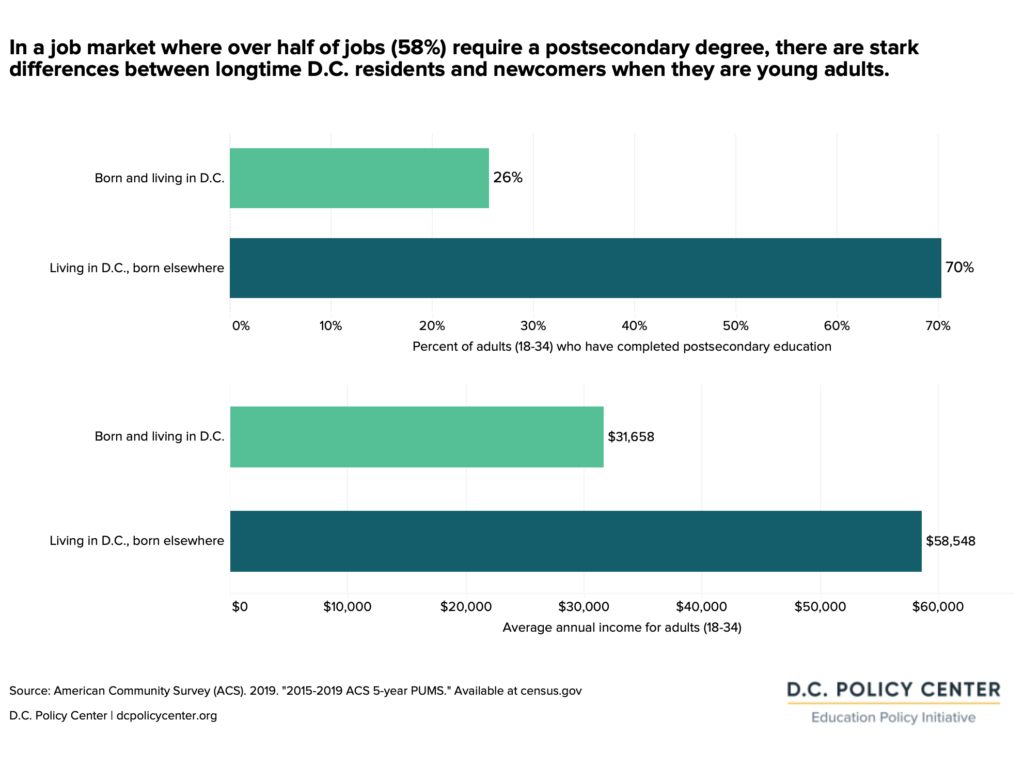

On April 5, 2023, Director of the Education Policy Initiative Chelsea Coffin testified during the FY2024 budget oversight hearing on education agencies before the Committee of the Whole. The testimony focused on the critical importance of knowing what happens to D.C.’s high school alumni that will now be possible with the creation of the Education to Employment Data System (or P20W System) in the FY 2024 Budget. The testimony is based on the D.C. Policy Center report, Measuring early career outcomes in D.C. You can read her testimony below, or download a PDF copy.
D.C.’s public and public charter schools serving students in pre-kindergarten through grade 12 strive to prepare students to succeed as young adults through college and in the workplace. While the city monitors key outcomes such as high school graduation rates and enrollment in postsecondary degree programs, we know very little about early career outcomes for D.C.’s public school alumni.
What we do know about outcomes after high school is sobering. Based on the most recent high school graduation, postsecondary enrollment, and postsecondary completion rates, the D.C. Policy Center estimates that out of every 100 9th graders, 8 will complete a postsecondary degree within six years of graduating high school (down from 14 out of every 100 pre-pandemic.)1 This is happening in a city where 58 percent of jobs require a postsecondary degree.2


For the other 92 out of 100 in this 9th grade cohort without a college degree, D.C. doesn’t have information on their employment or earnings–important indicators of whether alumni are able to lead choice-filled lives. As a proxy, young adults (ages 18 to 34) who were born and live in D.C. earned an average annual income of $31,658, a little more than half of the $58,548 earned by their peers who are living in D.C. but were born elsewhere.


Understanding more about District graduates’ experiences in their early careers will inform practices and investments to support current students and future graduates on a path to success. Other jurisdictions, like neighboring Maryland and Virginia, already do this in a few ways, including creating strong linkages between statewide longitudinal data systems for high school students and wage data reported for unemployment insurance administration from workforce agencies as proposed in the Education to Employment Data System of the FY 2024 Budget.
In recent years, D.C. has provided significant funding for high schoolers and their connections to college and career, including work-based learning, the Marion Barry Summer Youth Employment Program (MBSYEP), College Rising mentorship, DC Futures tuition assistance, and so much more. Investing in the Education to Employment Data System will connect the dots between high school and workforce for many alumni, allowing stakeholders (including Council, OSSE, LEAs, service providers, and the DC Education Research Collaborative, to name a few) to find out what is working in these programs and maximize these investments.3
Examining early career outcomes, including earnings and employment for alumni, deserves to be a focus point in education recovery after the pandemic. In addition to the decline in postsecondary completion now estimated at 8 out of every 100 9th graders, D.C. is seeing a mismatch between college and career readiness and college enrollment. For example, among Black students who represent 69 percent of high school students, 9 percent meet or exceed expectations for college and career readiness in math and 20 percent do so in ELA, but a much higher share—49 percent—of high school graduates who are Black enroll in postsecondary six months after graduation. D.C. needs a better understanding of what happens on the career side for alumni.
Endnotes
- D.C. Policy Center. 2023. State of D.C. Schools, 2021-22: In-Person Learning, Measuring Outcomes, and Work on Recovery. D.C. Policy Center. Retrieved from https://www.dcpolicycenter.org/publications/schools-21-22/
- Coffin, C. and Rubin, J. 2021. Measuring early career outcomes in D.C. D.C. Policy Center. Retrieved from https://www.dcpolicycenter.org/publications/measuring-outcomes/
- Coffin. C. and Rubin, J. 2021. Measuring early career outcomes in D.C. D.C. Policy Center. Retrieved from https://www.dcpolicycenter.org/publications/measuring-outcomes/

